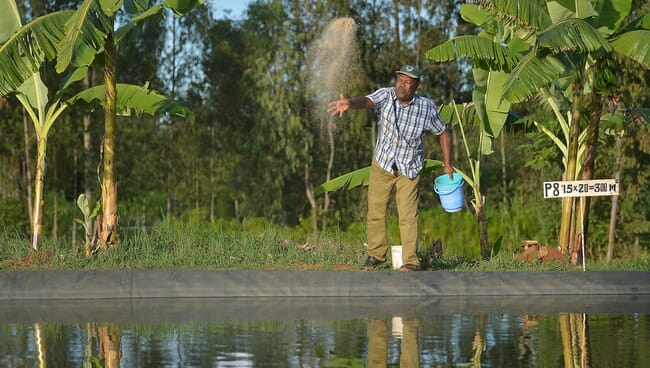
With aquaculture mostly practiced in Asia, industry experts point to the need for it to be distributed more evenly, with immediate efforts required to stimulate its development in Africa and Latin America © Tony Karumba/FAO
Aquaculture has seen enormous progress in recent decades and is destined to produce much of the ever-growing demand for aquatic food.
A set of articles published by leading experts in the field outline the need for the sector to have an updated set of governing principles that ensure that it expands and intensifies, while also embracing modern technologies, in a way that is environmentally and socially responsible, economically viable, and able to meet the needs of present and future generations.
Arising from the latest Global Conference on Aquaculture Millennium +20 held in Shanghai – organised by the Food and Agriculture Organization of the United Nations (FAO) and partners as part of a decadal series of such conferences – the eight articles cover key themes for an expanding sector already playing a major role in meeting the world’s nutritional needs.
“Given that aquaculture now supplies around 50 percent of aquatic food and given its potential to contribute to so many of the UN’s Sustainable Development Goals, we all need to focus on how to move it forward in a sustainable way,” said Xinhua Yuan, FAO’s deputy director for aquaculture, in a press release.
“Fish and other aquatic products can and will play a major role in meeting the dietary demands of all people, helping improve the resilience of global food system, while also meeting the food security needs of the poorest,” he added.
The eight articles discuss critical themes for aquaculture, including production methods, social issues and planetary health, nutrition, genetic resources, biosecurity, governance, and inclusive market access.
Here is a round-up of key messages from the articles:
- The future growth of aquaculture should be climate smart even as we seek to use the ocean more effectively, efficiently, and intelligently to supply food. Emphasising integrated growth in low trophic level culture species (such as seaweeds and filter feeding bivalve molluscs and finfish) will be important in this regard.
- Aquaculture is mostly practiced in Asia and needs to be distributed more evenly, with immediate efforts to stimulate its development in Africa, Latin America and Small Island Developing States.
- Great progress has been achieved in improving feed efficiency and reducing the use of marine sourced ingredients, but more innovation will be needed, especially for many of the species being farmed in the developing world.
- In contrast to terrestrial agriculture, selective breeding programmes to develop more efficient farmed types of aquatic species are heavily underutilised, currently accounting for only around 15 percent of production.
- Biosecurity should be enhanced and take a more proactive approach through improved disease-alerting systems, integrated data and regulatory frameworks that reduce the risk of the spread of aquatic epidemic diseases.
- Digital and electronic technologies can be harnessed to improve food safety concerns and certification protocols, such as traceability system, e-commerce, as well as broadening market access.
- There is a need for many countries to develop and implement supportive, dedicated legislation, through a lead agency, to coordinate regulations that promote sustainable development whilst ensuring public wellbeing without overly constraining the capacity of aquaculture systems to cope with environmental and social challenges.
- Having established itself as a major food producing and economic sector, aquaculture now needs to proactively integrate social responsibility and human wellbeing perspectives at all scales, including both workers and communities at large.
- Certification of sustainability and of decent work standards is a downstream demand, and yet the burdens of compliance fall disproportionately on producers, especially smaller-scale aquaculture operators. Mechanisms to redistribute costs and benefits equitably between producers and retailer should be sought and implemented.
The eight thematic review articles are published in a special issue of the Journal of the World Aquaculture Society.



